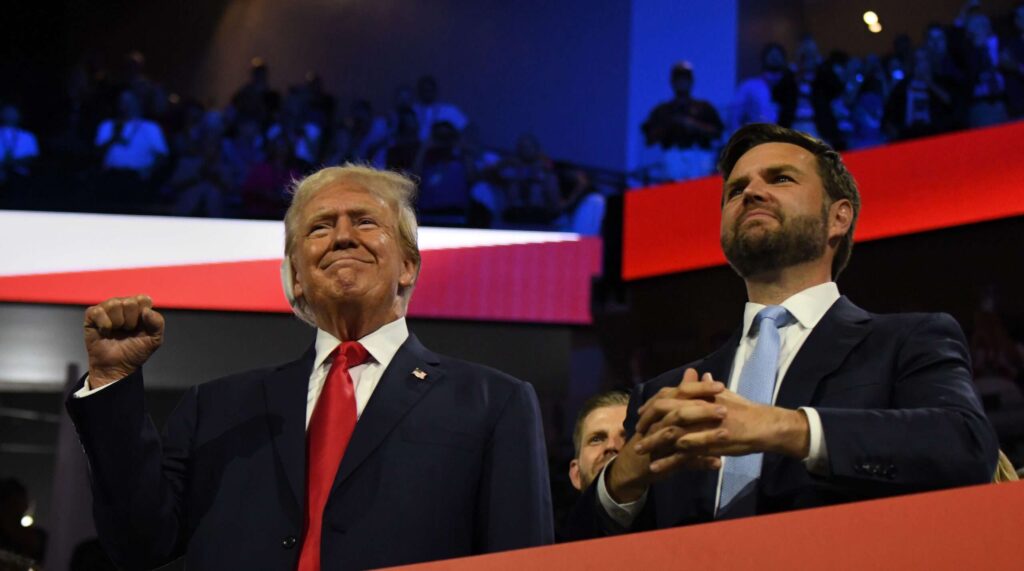From the headlines, you might think that Republican presidential candidate Donald Trump and his running mate J.D. Vance are committed to overturning the national security establishment.
Report: ‘Trump’s selection of Vance widens rift with foreign policy conservatives’ Bloomberg.
“Trump’s VP election means ‘disaster’ for Europe and Ukraine,” rages Politico.
Yet despite Trump’s rhetoric about “endless wars” and Vance’s attacks on “neoconservatives,” both politicians have gone all out to pursue some of the establishment’s most destructive military adventures. In some ways, Trump and Vance are even more hawkish than the bottom line.
“A lot of people recognize that we need to take some action against Iran, but not these weak little bombing campaigns,” Vance told Fox News on Monday at the Republican National Convention. “If you’re going to hit the Iranians, hit them hard. They, that’s it [Trump] did when he took it out [Iranian Gen. Qassem] Suleimani.
Vance praised Trump for trying to “help Israel and Sunni Arab countries” fight back against Iran. In a speech at the Quincy Institute in May, Vance sought to sell the U.S.-Israeli-Arab alliance as a way for the U.S. to “spend less time and resources in the Middle East.”
But it’s the strategy that got us here, and the proof is in the pudding. Trump’s show of force against Iran did not decisively end the US-Iran conflict, and the Abraham Accords did not allow Israel and Arab countries to make up for their military shortcomings.
Instead, Trump ended up overseeing a massive U.S. military buildup in the region and coming close to war with Iran during his term.
Vance even wants to add another counterinsurgency operation to America’s “forever wars” list. In July 2023, he told NBC News that he would “authorize the president of the United States, whether a Democrat or a Republican, to use the power of the U.S. military to go after these drug cartels in Latin America.”
Washington has become heavily involved in the region’s war on drugs and has provided support to Latin American militaries and border forces. Last year, several Republican candidates, including Trump himself, called for an outright U.S. invasion of Mexico.
Trump and Vance also agree with the establishment that the United States needs to prepare for a conflict with China over Taiwan. At the convention, Vance told Fox News that China is the “biggest threat” to the United States and that he has expressed support in the past for using U.S. weapons to build Taiwan’s military.
To his credit, Vance has been more thoughtful about the risks of escalation than some other China hawks. “As a father of three, I really don’t want to go to war with a country that produces all of our antibiotics,” he said in a speech at the Quincy Institute. “So for the neoconservatives, maybe put the brakes on for at least 10 years.”
The position Trump and Vance are most at odds with the foreign policy establishment is their opposition to U.S. military aid to Ukraine. In a speech to the Senate in February, Vance complained that “experts have come up with a new thing that American taxpayers must fund and must fund indefinitely, and it’s called the Ukraine conflict.” He has also written about the consequences of the war. Ammunition Shortage article, a rare honest statement from a politician about the limits of American power.
Vance told Fox News at the convention that Trump would “go in there and negotiate with the Russians and the Ukrainians, [and] He also said that if Trump were in power, the war would never break out. President of the United States – a fact he bragged about at the time.
Tellingly, during a presidential debate in June, Trump blamed President Joe Biden for starting the conflict in Ukraine by withdrawing U.S. troops from Afghanistan. “He was so terrible about Afghanistan, it was so embarrassing,” Trump said. “When [Russian President Vladimir] Putin saw this and he said, ‘You know what? I think we’re going in.
This isn’t really an argument against war – just a commitment to do better than the last man standing.
Many Democrats and Republicans want to have their cake and eat it too. They know Americans are tired of endless military conflicts, but they want to make their opponents appear weak. Liberal criticism of Trump’s foreign policy is as incoherent as conservative criticism of Biden’s foreign policy.
But trying to win harder is not a strategy. America’s problem isn’t just a lack of gumption. Vance may be more willing than his rivals to acknowledge the limits of American power. When it comes to practical application of these insights, he falls far short.

